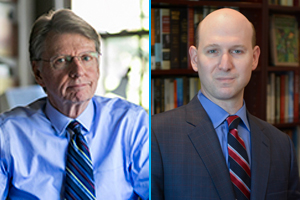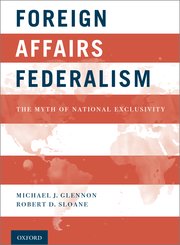Professors Robert Sloane and Michael Glennon Author Foreign Affairs Federalism
Book discusses the conduct of US state and local governments and its effects on the US federal government’s international relations.

Robert D. Sloane, R. Gordon Butler Scholar in International Law and professor of law at Boston University School of Law, and Michael Glennon, professor of international law at the Fletcher School of Law and Diplomacy at Tufts University and former William and Patricia Kleh Visiting Professor in International Law at BU Law, have coauthored Foreign Affairs Federalism: The Myth of National Exclusivity, published in May 2016 by Oxford University Press.
In their book, Professors Sloane and Glennon discuss the Constitutional allocation of foreign affairs powers between the federal and state governments. They describe the uncertain legal status of state and local governments as they conduct foreign affairs and call for thoughtful analysis and action from the judiciary. They argue that since no major activity today has purely domestic implications, lawyers cannot think clearly about the breadth of local authority unless they understand the law that applies to international activities.
Traditionally, US foreign affairs—especially in the areas of national security, military action, international trade and treatise—have been under the purview of the US federal government. However, globalization and digitized communication have increasingly enabled US states, counties, and municipalities to conduct cross-border interaction and empowered them to participate in various aspects of international relations. This transition in power holds implications for international trade, commerce, and investment, and affects key issues such as terrorism and national security while global diplomatic relations hang in the balance.
“At times like these,” says Sloane, “it’s critical for the nation to appreciate how state and local power can contribute to contemporary values and goals while adapting Constitutional law and practice to twenty-first century challenges.”
As concerns about hyper-partisanship, federal gridlock, and dysfunction in the national system grow, the extent to which states and other local governments have stepped into the breach has been overlooked. According to Sloane, there’s a widespread belief that federalism, in general, has a particular political valence: that more state power invariably means more conservative policies while more federal power means more liberal policies. “This is empirically false or at least vastly overstated, not just with respect to domestic affairs, but also in the realm of foreign affairs and international law,” says Sloane.
Sloane further elaborates that while leaving foreign or international issues to the federal government continues to make the most sense, sometimes it’s worth reexamining that assumption. Local governments are in a position to respond more readily to their constituents’ interests, and have stepped in to offer solutions where the federal government either has not or, for reasons of federal gridlock or otherwise, cannot act. “One example is the realm of cyber-security, which we use as a case study toward the end of the book,” he says. “The comparative advantages of state and federal governance often complement each other and need to be viewed as complementary rather than exclusive.”
 In Foreign Affairs Federalism, the authors identify the clear and murky areas of the law. Where the law is unclear, they highlight the most plausible or compelling perspectives on existing doctrine. They also appraise existing doctrine against the background of the diverse challenges faced by the US.
In Foreign Affairs Federalism, the authors identify the clear and murky areas of the law. Where the law is unclear, they highlight the most plausible or compelling perspectives on existing doctrine. They also appraise existing doctrine against the background of the diverse challenges faced by the US.
Professor Glennon emphasizes the need for courts to move beyond the myth that the federal government has exclusive authority in the international realm. He notes that non-federal players have limited greenhouse gas emissions, declared nuclear free zones and sanctuaries for undocumented immigrants, and established thousands of sister-city relationships. Moreover, they have set up informal diplomatic offices abroad, and sanctioned oppressive foreign governments. Glennon asks, “The questions then arise whether, Constitutionally, states and cities can engage in these sorts of activities, where their power ought to be limited, and which branch of the federal government ought to enforce those limits—Congress or the judiciary?” Legal clarifications on this front will not only help define the powers of US states and cities but will also set the rules for individuals and companies conducting business abroad.
The authors describe their scholarly collaboration as an outcome of their being on the same philosophical wavelength. Both Glennon and Sloane have previously written about the the respective roles of the President, Congress, and the judiciary in foreign relations. The logical next step for them was to look at the remaining governmental actors: states and cities. This book aims to address the gap in the literature concerning the power of states and cities in the international realm.
“Professor Glennon proposed the idea to Oxford University Press several years ago,” Sloane says. “We have long been interested in a series of issues that converge in foreign affairs federalism: the powers of the federal government internationally, national security, republican political theory, and the reasons and potential solutions for modern political dysfunction in the nation, particularly at the federal level. As we discussed the issues, we realized that our collaboration could yield a whole greater than the sum of the parts.” They finished the manuscript during Glennon’s term as visiting professor at BU Law in the fall 2015 when they co-taught a seminar entitled Democracy and the Rule of Law.
Reported by Indira Priyadarshini (COM’16).